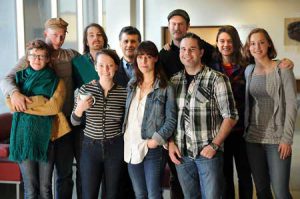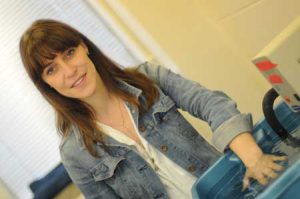
Award-winning singer visits music cognition lab
By Daniel J. Levitin
A few dozen diligent students, hard at work in Stewart Biology building over the weekend of Dec. 3, were rewarded by a surprise rock star sighting. Those who poked their heads out of their labs at the right time bumped into Feist and her band, who were on campus to visit my laboratory. The five-time Juno winner (and four-time Grammy nominee) was in town with her band to play to an audience of 2,400 at Metropolis. A few days before the sold-out show, Charles Spearin, a member of her band as well as Broken Social Scene, emailed me and arranged for the entire band to drop by the lab for a visit, to learn more about the work we do and to ask questions about music and the brain.
I gave them a tour of our lab and showed them demos of some of our recent experiments. They were especially interested in the work of my recent doctoral student, Anjali Bhatara, on how musicians communicate musical emotion through variations in timing and loudness. The idea that something as artsy or “soft” as emotion could be quantified, and that it corresponded with their intuitions, was both intruiging and reassuring to them.
Leslie Feist, backup singer Amelia Meath, and keyboardist Brian Lebarton, participated in an experiment we’re currently running on pain perception in collaboration with Professor Jeff Mogil. Undergraduate Neurosciences major Georgia Hathaway and post-doctoral researcher Loren Martin were the lucky ones who got to ask them to immerse their hands in ice-cold water to study their pain reaction. Apparently the musicians didn’t find the experiment overly painful, as they offered the student researchers free tickets to the Metropolis show.

Same topic, varied interests
All seven members of the band have a deep fascination with the psychology of music, but each come to it from different perspectives and, naturally, with different interests. Singer Molly Sarle has been reading on the spiritual and mystical basis of music; drummer Paul Taylor is interested in music therapy and wanted to know how much real, scientific evidence there is to support its claims (not much, but recent experiments are starting to use adequate scientific controls and a body of evidence is slowly emerging). Keyboardist Brian Lebarton was interested in the extent to which the major = happy, minor = sad rule in Western music is innate, versus culturally determined (the evidence is mixed, but it seems that this is cultural).
For the current tour, Feist has united with a trio of singers from just south of here: Amelia Meth, Molly Sarle and Alexandra Sauser-Monning, who met at Bennington College in Vermont, perform under the group name Mountain Man, and are serving as backup singers. They treated all of us to an impromptu and mesmerizing performance of the song Bright Morning Stars Are Shining, rich with their Appalachian-style three-part harmony.
For my students and I, one of the unanticipated benefits of working in a laboratory that studies the science of music is that curious musicians do drop in when they’re in town. This has been fun and informative for all of us. When Bobby McFerrin came by two summers ago, he had helpful advice that led to us redesigning two experiments, and he also served as a participant in a study of musical memory. Other recent visitors have included Sting, Steely Dan, David Byrne, Joni Mitchell, Arcade Fire, Gary Lucas and Victor Wooten.
